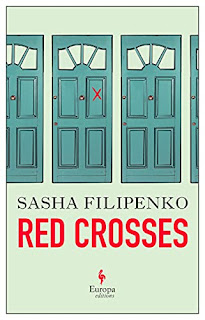Stephanie Jane recenzis Red Crosses de Sasha Filipenko
A perfectly balanced work
5 steloj
The first aspect of Red Crosses that caught my attention was the similarities between elderly Tatiana in this novel and grandmother Appamma in A Passage North by Anuk Arudpragasam: both formerly strong women trapped by the frailties of aging and striving to maintain as much of their previous independence as they can for as long as they can, yet also desperate for companionship and human connections. I love Tatiana as a character. Often bluntly direct in her responses to Alexander, she is also a wonderfully engaging narrator with a particularly grim story to tell. I think, on the strength of Tatiana alone, that Red Crosses would appeal to fans of Ruta Sepetys' historical novels. I was also reminded of Good People by Nir Baram and Daniil Kharms' sharply observed essays.
Alexander is perhaps less immediately appealing a character, but I appreciated that seeing through his eyes enabled me to understand …
The first aspect of Red Crosses that caught my attention was the similarities between elderly Tatiana in this novel and grandmother Appamma in A Passage North by Anuk Arudpragasam: both formerly strong women trapped by the frailties of aging and striving to maintain as much of their previous independence as they can for as long as they can, yet also desperate for companionship and human connections. I love Tatiana as a character. Often bluntly direct in her responses to Alexander, she is also a wonderfully engaging narrator with a particularly grim story to tell. I think, on the strength of Tatiana alone, that Red Crosses would appeal to fans of Ruta Sepetys' historical novels. I was also reminded of Good People by Nir Baram and Daniil Kharms' sharply observed essays.
Alexander is perhaps less immediately appealing a character, but I appreciated that seeing through his eyes enabled me to understand the contrasts between these two apparently very different people who discover they actually share similar griefs. Filipenko's inclusion of original historical documents - letters, telegrams and reports - gives a real sense of authenticity to the fictional tale woven around them and, like the Swiss Red Cross workers, I struggled to comprehend official Soviet attitudes.
Red Crosses is a pretty dark novel set mostly in a horrific period of history, but I loved reading it. Tatiana's need to come to terms with what was done to her and her family, as well as the wrongs she inflicted upon others, is beautifully portrayed, especially in the light of her encroaching dementia. This woman could easily have been reduced to a caricature, resulting in the novel itself losing plausibility, but instead Filipenko has written a perfectly balanced work that I am grateful to have had this opportunity to read.

